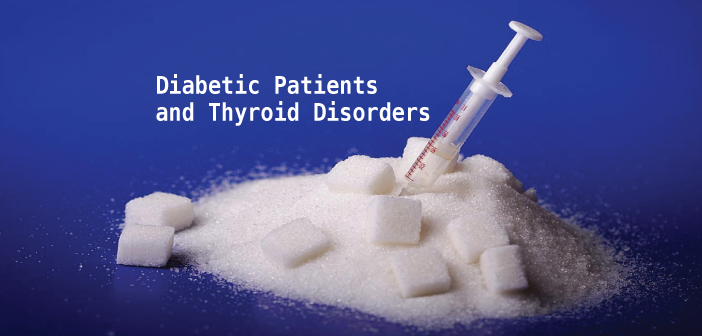
Danna Bowman, Founder
Thyroid Nation
From a good friend and a Thyroid Thriver…Catrina Gaines-Wimberly, thank you!
Diabetic Patients And Thyroid Disease
Diabetic patients have a higher prevalence of thyroid disorders compared with the normal population. Because patients with one organ-specific autoimmune disease are at risk of developing other autoimmune disorders, and thyroid disorders are more common in females, it is not surprising that up to 30% of female type 1 diabetic patients have thyroid disease. The rate of postpartum thyroiditis in diabetic patients is three times that in normal women. A number of reports have also indicated a higher than normal prevalence of thyroid disorders in type 2 diabetic patients, with hypothyroidism being the most common disorder.
Prevalence Rates for Thyroid Disease
 Thyroid disease in the general
Thyroid disease in the general
population: 6.6%
Thyroid disease in diabetes:
Overall prevalence: 10.813.4%
Hypothyroidism: 36%
Subclinical hypothyroidism: 513%
Hyperthyroidism: 12%
Postpartum thyroiditis: 11%
Diabetic patients have a higher prevalence of thyroid disorders compared with the normal population. Because patients with one organ-specific autoimmune disease are at risk of developing other autoimmune disorders, and thyroid disorders are more common in females, it is not surprising that up to 30% of female type 1 diabetic patients have thyroid disease. The rate of postpartum thyroiditis in diabetic patients is three times that in normal women. A number of reports have also indicated a higher than normal prevalence of thyroid disorders in type 2 diabetic patients, with hypothyroidism being the most common disorder.
Noninsulin-dependent diabetes; Diabetes – type 2; Adult-onset diabetes
Type 2 diabetes develops when the body becomes resistant to insulin or when the pancreas stops producing enough insulin. Exactly why this happens is unknown, although excess weight and inactivity seem to be contributing factors.
Insulin is a hormone that comes from the pancreas, a gland situated just behind and below the stomach. When you eat, the pancreas secretes insulin into the bloodstream. As insulin circulates, it acts like a key by unlocking microscopic doors that allow sugar to enter your cells. Insulin lowers the amount of sugar in your bloodstream. As your blood sugar level drops, so does the secretion of insulin from your pancreas.
Glucose — a sugar — is a main source of energy for the cells that make up muscles and other tissues. Glucose comes from two major sources: the food you eat and your liver. After intestinal digestion and absorption, sugar is absorbed into the bloodstream. Normally, sugar then enters cells with the help of insulin.
The liver acts as a glucose storage and manufacturing center. When your insulin levels are low — when you haven’t eaten in a while, for example — the liver metabolizes stored glycogen into glucose to keep your glucose level within a normal range.
Thyroid dysfunction is common in diabetic patients and can produce significant metabolic disturbances. Therefore, regular screening for thyroid abnormalities in all diabetic patients will allow early treatment of subclinical thyroid dysfunction. A sensitive serum TSH assay is the screening test of choice. In type 1 diabetic patients, it is helpful to determine whether anti-TPO antibodies are present. If these are present, then annual TSH screening is warranted. Otherwise, a TSH assay should be done every 23 years. In type 2 diabetic patients, a TSH assay should be done at diagnosis and then repeated at least every 5 years.
About the Author
Patricia Wu, MD, FACE, FRCP, is an endocrinologist with the Southern California Permanente Medical Group and an assistant clinical professor of medicine at the University of California, San Diego.
PLEASE take a moment to ‘Like’ us on Facebook and follow us on Twitter and Pinterest. You can also listen to Tiffany and I on Thyroid Nation RADIO.
Questions or anything to add about diabetes and the thyroid? We want your thoughts, please. You might just help someone else in need.
Source
http://journal.diabetes.org/clinicaldiabetes/v18n12000/pg38.htm



